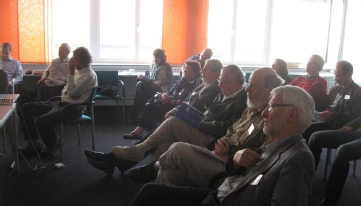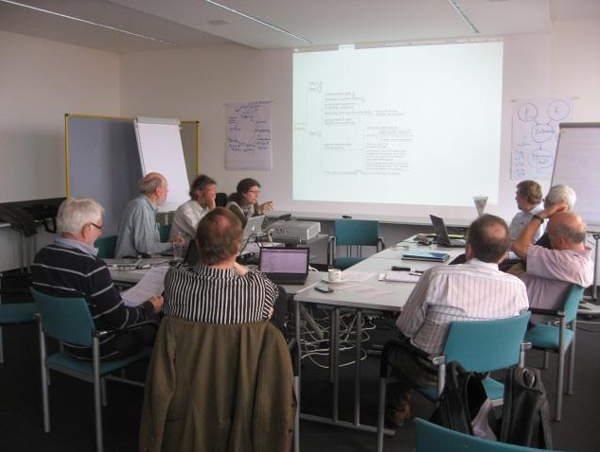IFSR Newsletter 2012 Vol. 29 No. 2 December
The IFSR Conversation in St. Magdalena, Linz, was in our opinion one of the most fruitful in the history of IFSR Conversations. In many ways, the teams returned to the early principles of the Conversations, exchanging papers and ideas in advance of the week together, and continuing their collaboration afterwards as papers were written for the proceedings. The 4 teams worked hard, supported by the environment of the excellent meeting facilities in St. Magdalena, Linz. Team members continued to work together by email and conference calls, following the Conversation itself, refining the ideas which had been generated. Especially Team 3 and Team 4 were very active in this respect.
You will find some of the ‘next steps’ described in the sections below.
In the meantime Gary and Gerhard managed to publish the proceedings1. Like the proceedings from the Conversation in 1998 2 it contains 118 pages, making it one of the two most voluminous reports in our 29 year of history.
This time, though, there was considerably more material from Team 3 and 4 than we could fit into the proceedings. So we created a ‘supplement’ 3 where additional material was included pertinent to the deliberations of the teams but not of prime interest, including several participants’ reports.
A few printed copies of the proceedings were produced to be archived, but electronic versions of both the proceedings and the supplement are freely available on the IFSR website, for viewing and downloading.
The plan for now is to hold the 2014 Conversation once again at St. Magdalena, in Linz. Yoshi Horiuchi is the point person on the Executive Committee preparing for the next event.
Find below the cover page and the table of contents of the IFSR Conversation 2012.
Gary Metcalf, Gerhard Chroust
1 Chroust, G. & Metcalf, G., editors (2012). Systems and Science at Crossroads – Sixteenth IFSR Conversation. Inst. f. Systems Engineering and Automation, Johannes Kepler University Linz, Austria, SEA-SR-32, Sept. 2012 and [http://ifsr.ocg.at/world/files/$12m$Magdalena-2012-proc.pdf], 118pp
2 BENEDER, M. , G. CHROUST, (eds.) Designing Social Systems in a Changing World (The Ninth Fuschl Conversation 1998) ÖSGK, Reports of the Austrian Society for Cybernetic Studies, Vienna, September 1998, 118 pp.
3 Chroust, G. , and Metcalf, G. (eds.) (2102c) Systems and Science at Crossroads – Sixteenth IFSR Conversation – Supplement Inst. f. Systems Engineering and Automation, Johannes Kepler University Linz, Austria, SEA-SR-32, Nov.2012 and[http://ifsr.ocg.at/world/files/$12n$Magdalena-2012-supp.pdf]., 138pp.

Figure 1: Listening to the results, IFSR Newsletter 2012 Vol. 29 No. 2 December
Team 3: Curating the Conditions for a Thrivable Planet: Systemic Leverage Points for Emerging a Global Eco-Civilization
(IFSR Conversation 2013 – continued)
Team Members:
Alexander Laszlo (USA) alexander@syntonyquest.org (co-teamleader)
Stefan Blachfellner (Austria) stefan@blachfellner.com (co-team leader)
Ockie Bosch (Australia) ockie.bosch@adelaide.edu.au
Nam Nguyen (Australia and Vietnam) nam.nguyen@adelaide.edu.au
Violeta Bulc (Slovenia) violeta.bulc@vibacom.si
Mary Edson (USA) coaching4success@msn.com
Jennifer Wilby (UK) jmwilby@gmail.com
George Pór (UK) – virtually via internet george.por@gmail.com

Team 3: Curating the Conditions for a Thrivable Planet: Systemic Leverage Points for Emerging a Global Eco-CivilizationTeam 3: Curating the Conditions for a Thrivable Planet, 16th IFSR Conversation 2012, IFSR Newsletter 2012 Vol. 29 No. 2 December
Team 3 of the IFSR Conversation 2012 4 has used the design platform created during our week of intense work at St. Magdalena, Linz in April of 2012 to structure the design of the 57th Meeting and Conference of the ISSS (International Society for the Systems Sciences. We have used the frameworks created in Linz as a template for the overall organization of the conference, and the team, itself, has formed into the EGS – Evolutionary Guidance System – of the Organizing Committee for the 2013 ISSS event (refer to http://isss.org/world/Committees to see how we have organized ourselves).
The main systems design outcomes of this process are:
- The design of a process for curating the emergence of the thematic elements of the conference through the use of collective intelligence in a holarchic organizational structure. Using the Four Domains of Knowing identified in Linz (experiential knowing, presentational knowing, propositional knowing, and practical knowing, cf. Heron and Reason in 19975), we are operating according to Generative Action Research, and in doing so, we are modeling the processes of relational intelligence we wish to bring alive at the ISSS Conference, itself.
- The prototyping of the Collective Intelligence Enhancement Laboratory (CIEL) which is to serve as the operational infrastructure that undergirds the entire ISSS conference. The reason it would be a prototype is that this would be the first functional implementation of this socio-technical systems design.
- The objective of prototyping the CIEL is to then use it full strength in the Global Evolutionary Learning Laboratory (GELL) beyond the conference. The GELL is the standing network of intertwined systemic sustainability initiatives around the world that, when established, will comprise a key leverage point in the emergence of a global eco-civilization and, as such, will contribute to conditions that favor a thrivable planet.
4 See IFSR Newsletter vol. 29, no 1, p.19 and Chroust, G. & Metcalf, G., editors (2012). Systems and Science at Crossroads – Sixteenth IFSR Conversation. Inst. f. Systems Engineering and Automation, Johannes Kepler University Linz, Austria, SEA-SR-32, Sept. 2012 and [http://ifsr.ocg.at/world/files/$12m$Magdalena-2012-proc.pdf] pp. 41-74.
5 Heron, John and Reason, Peter (1997). A participatory inquiry paradigm. Qualitative Inquiry, 3(3), p. 274-294.
Team 4: Towards a Common Language for Systems Praxis

Team 4: Towards a Common Language for Systems PraxisTeam 4: Towards a Common Language for Systems Praxis, 16th IFSR Conversation 2012, IFSR Newsletter 2012 Vol. 29 No. 2 December
Team Members:
James Martin (USA), martinqzx@gmail.com (Leader),
Johan Bendz (SE), johan@bendz.se
Gerhard Chroust (AUT), Gerhard.Chroust@jku.at
Duane Hybertson (USA), dhyberts@mitre.org
Harold “Bud” Lawson (SE), bud@lawson.se
Richard Martin (USA), richardm@tinwisle.com
Hillary Sillitto (UK), hillary.sillitto@blueyonder.co.uk
Janet Singer (USA), jsinger@soe.ucsc.edu,
Michael Singer (USA), mjsinger@soe.ucsc.edu
Tatsumasa Takaku (JP) takakut@kamakuranet.ne.jp

Figure 2: Team leader after the Conversation: James Martin, Team 4: Towards a Common Language for Systems PraxisTeam 4: Towards a Common Language for Systems Praxis, 16th IFSR Conversation 2012, IFSR Newsletter 2012 Vol. 29 No. 2 December
The culmination of the Team 4 effort at the IFSR Conversation 20126 last April was a diagram titled “Unifying Systems Praxis.” After the conclusion of the IFSR Conversation, some team members continued developing the diagram to resolve issues not fully addressed during the week and further realize the integrative potential revealed in the original. The resulting “Systems Praxis Framework” was included in International Council on Systems Engineering (INCOSE) Guide to the Systems Engineering Body of Knowledge (SEBoK) at http://www.sebokwiki.org. The diagram and accompanying explanatory text is also available as a standalone brochure under a Creative Commons license at http://systemspraxis.org.
6 See IFSR Newsletter vol. 29, no 1, p. 21 and Chroust, G. & Metcalf, G., editors (2012). Systems and Science at Crossroads – Sixteenth IFSR Conversation. Inst. f. Systems Engineering and Automation, Johannes Kepler University Linz, Austria, SEA-SR-32, Sept. 2012 and [http://ifsr.ocg.at/world/files/$12m$Magdalena-2012-proc.pdf] pp. 75-108.

Figure 1: The Systems Praxis Framework, Team 4: Towards a Common Language for Systems Praxis, 16th IFSR Conversation 2012, IFSR Newsletter 2012 Vol. 29 No. 2 December
